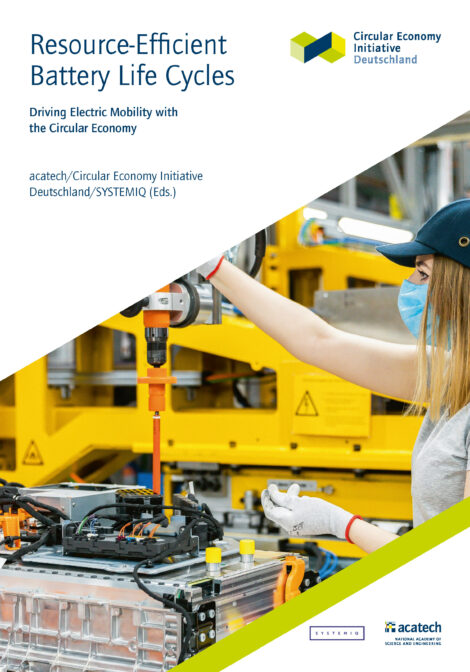Resource-Efficient Battery Life Cycles – Driving Electric Mobility with the Circular Economy
Most current patterns of production and consumption follow a linear “extract, produce, consume, dispose” model. According to the Circular Gap Report 2020, the global economy is just 9% circular. This economic model is contributing to a massive transgression of “planetary boundaries” and the destabilisation of ecosystems and factors essential to human life such as the climate system and biodiversity. As a result, there is currently much discussion of a paradigm shift in the industrial value creation model, away from a resource-intensive system and towards a resource-productive, predominantly circular model. This shift offers significant opportunities for an industrialized, exporting nation like Germany – ultimately, it entails nothing less than a recasting of the “Made in Germany” model.
The European Union and several of its member states have already developed strategic plans for the transition to a resource-efficient economic system based on circular economy principles. Non-European countries such as China, Japan and Canada are also following the same fundamental approach. However, Germany has yet to formulate a plan of its own.
The Circular Economy Initiative Deutschland (CEID) is a multi-stakeholder initiative involving over fifty institutions from science, industry and civil society that aims to lay the foundations of a plan for Germany. In its interdisciplinary, cross-sectoral working groups, some 130 experts consider how to enable and implement circular economic models, exploring potential fields of application and discussing the conditions that could facilitate successful implementation. The Circular Economy Initiative Deutschland is developing targets for the transition, with a focus on the following themes:
- Circular business models and digital technologies as drivers for innovation
- New value networks for batteries and packaging
- Framework conditions for a circular transformation and assessment of circularity’s economic potential
Between October 2019 and May 2020, the Circular Economy Initiative Deutschland’s Traction Batteries working group devised a roadmap for the establishment of a circular economy for traction batteries (the batteries that drive battery electric vehicles).
The report “Resource-Efficient Battery Life Cycles – Driving Electric Mobility with the Circular Economy” represents the main outcome of the working group’s deliberations. It discusses the opportunities, obstacles and potential conflicts of a circular economy for traction batteries, outlines a vision, presents plans for three pilot projects to accelerate the transformation and formulates recommendations for the main actors. Through this report, the working group’s members hope to support the initiation and long-term consolidation of a circular economy in Germany and beyond.
The working group’s 21 members are representatives of leading academic institutions, German businesses and organisations known for their expertise in the field of traction batteries. This composition allowed the group to achieve its goal of addressing the topic as holistically as possible.




